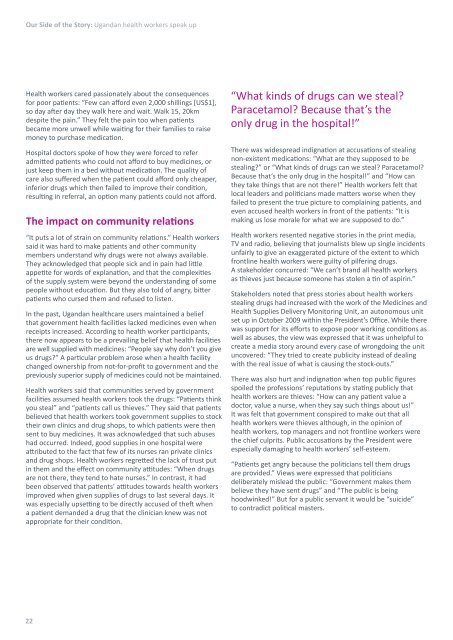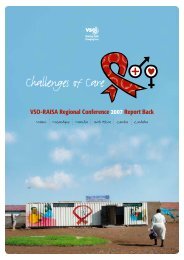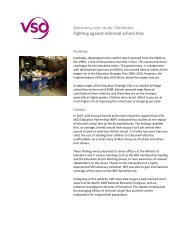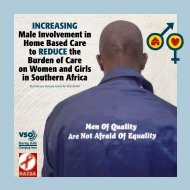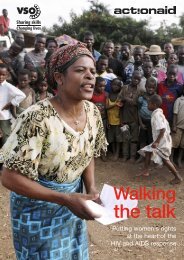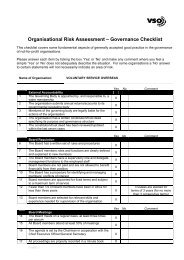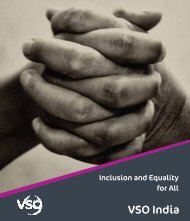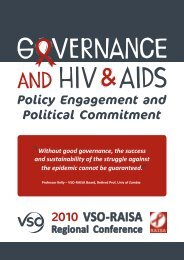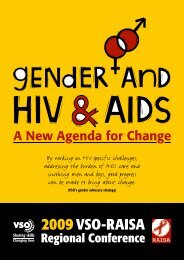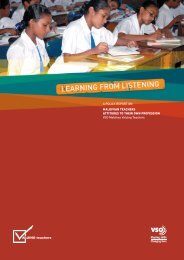Our Side of the Story - Ugandan health workers speak up - VSO
Our Side of the Story - Ugandan health workers speak up - VSO
Our Side of the Story - Ugandan health workers speak up - VSO
Create successful ePaper yourself
Turn your PDF publications into a flip-book with our unique Google optimized e-Paper software.
<strong>Our</strong> <strong>Side</strong> <strong>of</strong> <strong>the</strong> <strong>Story</strong>: <strong>Ugandan</strong> <strong>health</strong> <strong>workers</strong> <strong>speak</strong> <strong>up</strong><br />
Health <strong>workers</strong> cared passionately about <strong>the</strong> consequences<br />
for poor patients: “Few can afford even 2,000 shillings [US$1],<br />
so day after day <strong>the</strong>y walk here and wait. Walk 15, 20km<br />
despite <strong>the</strong> pain.” They felt <strong>the</strong> pain too when patients<br />
became more unwell while waiting for <strong>the</strong>ir families to raise<br />
money to purchase medication.<br />
Hospital doctors spoke <strong>of</strong> how <strong>the</strong>y were forced to refer<br />
admitted patients who could not afford to buy medicines, or<br />
just keep <strong>the</strong>m in a bed without medication. The quality <strong>of</strong><br />
care also suffered when <strong>the</strong> patient could afford only cheaper,<br />
inferior drugs which <strong>the</strong>n failed to improve <strong>the</strong>ir condition,<br />
resulting in referral, an option many patients could not afford.<br />
The impact on community relations<br />
“It puts a lot <strong>of</strong> strain on community relations.” Health <strong>workers</strong><br />
said it was hard to make patients and o<strong>the</strong>r community<br />
members understand why drugs were not always available.<br />
They acknowledged that people sick and in pain had little<br />
appetite for words <strong>of</strong> explanation, and that <strong>the</strong> complexities<br />
<strong>of</strong> <strong>the</strong> s<strong>up</strong>ply system were beyond <strong>the</strong> understanding <strong>of</strong> some<br />
people without education. But <strong>the</strong>y also told <strong>of</strong> angry, bitter<br />
patients who cursed <strong>the</strong>m and refused to listen.<br />
In <strong>the</strong> past, <strong>Ugandan</strong> <strong>health</strong>care users maintained a belief<br />
that government <strong>health</strong> facilities lacked medicines even when<br />
receipts increased. According to <strong>health</strong> worker participants,<br />
<strong>the</strong>re now appears to be a prevailing belief that <strong>health</strong> facilities<br />
are well s<strong>up</strong>plied with medicines: “People say why don’t you give<br />
us drugs” A particular problem arose when a <strong>health</strong> facility<br />
changed ownership from not-for-pr<strong>of</strong>it to government and <strong>the</strong><br />
previously s<strong>up</strong>erior s<strong>up</strong>ply <strong>of</strong> medicines could not be maintained.<br />
Health <strong>workers</strong> said that communities served by government<br />
facilities assumed <strong>health</strong> <strong>workers</strong> took <strong>the</strong> drugs: “Patients think<br />
you steal” and “patients call us thieves.” They said that patients<br />
believed that <strong>health</strong> <strong>workers</strong> took government s<strong>up</strong>plies to stock<br />
<strong>the</strong>ir own clinics and drug shops, to which patients were <strong>the</strong>n<br />
sent to buy medicines. It was acknowledged that such abuses<br />
had occurred. Indeed, good s<strong>up</strong>plies in one hospital were<br />
attributed to <strong>the</strong> fact that few <strong>of</strong> its nurses ran private clinics<br />
and drug shops. Health <strong>workers</strong> regretted <strong>the</strong> lack <strong>of</strong> trust put<br />
in <strong>the</strong>m and <strong>the</strong> effect on community attitudes: “When drugs<br />
are not <strong>the</strong>re, <strong>the</strong>y tend to hate nurses.” In contrast, it had<br />
been observed that patients’ attitudes towards <strong>health</strong> <strong>workers</strong><br />
improved when given s<strong>up</strong>plies <strong>of</strong> drugs to last several days. It<br />
was especially <strong>up</strong>setting to be directly accused <strong>of</strong> <strong>the</strong>ft when<br />
a patient demanded a drug that <strong>the</strong> clinician knew was not<br />
appropriate for <strong>the</strong>ir condition.<br />
“What kinds <strong>of</strong> drugs can we steal<br />
Paracetamol Because that’s <strong>the</strong><br />
only drug in <strong>the</strong> hospital!”<br />
There was widespread indignation at accusations <strong>of</strong> stealing<br />
non-existent medications: “What are <strong>the</strong>y s<strong>up</strong>posed to be<br />
stealing” or “What kinds <strong>of</strong> drugs can we steal Paracetamol<br />
Because that’s <strong>the</strong> only drug in <strong>the</strong> hospital!” and “How can<br />
<strong>the</strong>y take things that are not <strong>the</strong>re!” Health <strong>workers</strong> felt that<br />
local leaders and politicians made matters worse when <strong>the</strong>y<br />
failed to present <strong>the</strong> true picture to complaining patients, and<br />
even accused <strong>health</strong> <strong>workers</strong> in front <strong>of</strong> <strong>the</strong> patients: “It is<br />
making us lose morale for what we are s<strong>up</strong>posed to do.”<br />
Health <strong>workers</strong> resented negative stories in <strong>the</strong> print media,<br />
TV and radio, believing that journalists blew <strong>up</strong> single incidents<br />
unfairly to give an exaggerated picture <strong>of</strong> <strong>the</strong> extent to which<br />
frontline <strong>health</strong> <strong>workers</strong> were guilty <strong>of</strong> pilfering drugs.<br />
A stakeholder concurred: “We can’t brand all <strong>health</strong> <strong>workers</strong><br />
as thieves just because someone has stolen a tin <strong>of</strong> aspirin.”<br />
Stakeholders noted that press stories about <strong>health</strong> <strong>workers</strong><br />
stealing drugs had increased with <strong>the</strong> work <strong>of</strong> <strong>the</strong> Medicines and<br />
Health S<strong>up</strong>plies Delivery Monitoring Unit, an autonomous unit<br />
set <strong>up</strong> in October 2009 within <strong>the</strong> President’s Office. While <strong>the</strong>re<br />
was s<strong>up</strong>port for its efforts to expose poor working conditions as<br />
well as abuses, <strong>the</strong> view was expressed that it was unhelpful to<br />
create a media story around every case <strong>of</strong> wrongdoing <strong>the</strong> unit<br />
uncovered: “They tried to create publicity instead <strong>of</strong> dealing<br />
with <strong>the</strong> real issue <strong>of</strong> what is causing <strong>the</strong> stock-outs.”<br />
There was also hurt and indignation when top public figures<br />
spoiled <strong>the</strong> pr<strong>of</strong>essions’ reputations by stating publicly that<br />
<strong>health</strong> <strong>workers</strong> are thieves: “How can any patient value a<br />
doctor, value a nurse, when <strong>the</strong>y say such things about us!”<br />
It was felt that government conspired to make out that all<br />
<strong>health</strong> <strong>workers</strong> were thieves although, in <strong>the</strong> opinion <strong>of</strong><br />
<strong>health</strong> <strong>workers</strong>, top managers and not frontline <strong>workers</strong> were<br />
<strong>the</strong> chief culprits. Public accusations by <strong>the</strong> President were<br />
especially damaging to <strong>health</strong> <strong>workers</strong>’ self-esteem.<br />
“Patients get angry because <strong>the</strong> politicians tell <strong>the</strong>m drugs<br />
are provided.” Views were expressed that politicians<br />
deliberately mislead <strong>the</strong> public: “Government makes <strong>the</strong>m<br />
believe <strong>the</strong>y have sent drugs” and “The public is being<br />
hoodwinked!” But for a public servant it would be “suicide”<br />
to contradict political masters.<br />
22


